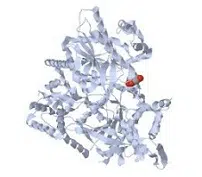In Greek is where we find the etymological origin of the term glycogen that concerns us now. Specifically, we can state that it is the result of the sum of several lexical components of said language:
-The adjective "glykys", which can be translated as "sweet."
-The word "geno", which is equivalent to both "lineage" and "produce."
The meaning of glycogen is "substance in the liver that stores sugars."
Glycogen is a biomolecule that is part of carbohydrates , also called carbohydrates or carbohydrates . It is a polysaccharide , since it is made up of a chain of ten or more monosaccharides (sugars that cannot be broken down into simpler ones through hydrolysis).
In addition to everything indicated, it is necessary to highlight the fact that the glycogen molecule was discovered in the mid-19th century by the scientist Claude Bernard. Specifically, it was in 1857 when he publicly announced this discovery that, at first, he called "sugar-forming substance" and that he arrived at through the studies he was carrying out in relation to the liver.
However, we would have to wait a little longer for another scientist, A. Sanson, to come across the fact that there was also glycogen in muscle tissue.
In this way, we can establish that it is important to know, in addition to everything stated above, that there are two types of glycogen:
-Liver glycogen, which is responsible for regulating the concentration of glucose in the blood.
-Muscle glycogen, which is the one whose mission is to maintain and cover the needs of the muscles during the development of any sporting activity.
 Present mainly in the liver , but also in muscles and other tissues, in certain plants and in fungi, glycogen is stored by the body as a reserve until, when the time comes for its use, it is converted into glucose (a monosaccharide).
Present mainly in the liver , but also in muscles and other tissues, in certain plants and in fungi, glycogen is stored by the body as a reserve until, when the time comes for its use, it is converted into glucose (a monosaccharide).
Similar to starch , glycogen is white in color. When an individual requires an emergency dose of energy , for example if they are in a state of alert or in a moment of tension, the body quickly degrades glycogen and transforms it into glucose, incorporating it into the metabolism.
Glycogen is stored in vacuoles (vesicles) in the cytoplasm of cells . These vacuoles have the enzymes that are needed to carry out the hydrolysis (the splitting using water) of glycogen into glucose.
There are various disorders that can cause problems in the formation and use of glycogen. One of them is diabetes , which, due to the storage of abnormal amounts of insulin, can cause the level of glycogen stored in the liver to not be adequate. It is important to keep in mind that both a lack and excess of glycogen are negative for the body and translate into different problems for organic functioning.
